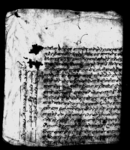A document recording a loan taken by Vīkmāṃ Bhoṭe from Kulmāna Giri, with a son pledged as security (VS 1956)
ID: K_0348_0040
Edited and
translated by Manik Bajracharya
in collaboration with
Raju Rimal
Created: 2017-08-07;
Last modified: 2018-11-26
For the metadata of the document, click here
The accompanying edition, translation/synopsis and/or commentary are available under the terms of the Creative Commons Attribution-ShareAlike 4.0 International License
Abstract
This is a loan agreement drawn up by Vīkmāṃ Bhoṭe for borrowing 37 mohararupaiyā̃s 2 sukās from Kulmān Giri. A son of the debtor, Kamāne Bhoṭe, is promised as a bond servant till the debt is repaid.Diplomatic edition
[1r]
1श्री\⟪1१⟫⟪1४४⟫[fingerprint of Vīkmāṃ Bhoṭe][fingerprint of Kālu Āle Magara][fingerprint of Haṃpu Āle Magara][signature of Jīvarāja Pādhyā]1साछी2रानाथोक्वस्न्याकालुआलेमगर¯¯¯¯¯¯¯¯¯¯¯¯¯¯¯¯¯¯१
3ऐं¯¯¯¯¯¯¯¯¯¯¯¯¯¯¯¯¯¯वस्न्याहंपुआलेमगर¯¯¯¯¯¯¯¯¯¯¯¯¯¯¯¯¯¯१
4लेषकसाछीनेपालवानेश्वरवस्न्याजीवराज
5पाध्या¯¯¯¯¯¯¯¯¯¯¯¯¯¯¯¯¯¯१1लीषीतम्धनीकनाम•सागाचोक्मध्ये•छोटेडाडावस्न्यापी
2रमहंतकुल्मान्गीरी•धनवेहोरीनीकनाम•सागाचोक्मध्ये
3षाल्साडढुवाडाडाछापटारवस्न्यावीक्मांभोटेगतलीह
4ल्चादीकामोरूपैञा३७॥अक्षरेपिसाढेसैतीस्क
5र्जालीञावापत्घरषर्चगर्नाकेकर्जालीय़ाकोहुंय
6सरूपैञा•मामेराकांछीस्वाश्नीपट्टीकोजेठोछो•रो
7कमानेभोटेभोगवाधालेषीदिञामाथीलेषीय़ाको
8साव़ामोहरू३७॥चुक्तीनहुंज्याल्साहुलेनीज•छोरो
9कमानेभोटे•लाई•घरमाराषीभोगचलन्गर्नु•मै
10लेनीजछोरोकोनीमेक्नषोजनु•साहुवाटरूपै
11ञाकोव्याजनषोजनु•नीज•कमानेभागीनसीसा
12हुकोकामहर्जागराय़ोवाअरूकौनैवेहोरालेसाहुकोभो
13हुनपाये़नभने•हर्जाभय़ाकादीनकोऐनवमोजीम्•
14नीमेकस्मेत्वुझाई•नीजकावदलामेरैज्यूभोगवाधा
15भैवसुला•वेउजुरभनीमेरामनोमान्षुसीराजीसग
16कीनाराकासाछीसदरगरी•भोगवाधाकोकागजले
17षीनीजसाहुलाईदीञा•इतीसंवत्१९५६साल•मिती
18फागुनसुदी६रोज५शुभ्म्¯¯¯ ¯¯¯¯¯¯¯¯ ¯¯¯¯¯¯¯
Translation
[1r]
11
442
[fingerprint of Vīkmāṃ Bhoṭe]
[fingerprint of Kālu Āle Magara]
[fingerprint of Haṃpu Āle Magara]
[signature of Jīvarāja Pādhyā]
Witnesses:
Kālu Āle Magara, resident of Rānāthok – 1
Haṃpu Āle Magara, resident of the same – 1
Scriber [and] witness Jīvarāja Pādhyā, resident of Bāneśvara, Nepāla (i.e., Kathmandu) – 1
Likhitam: [I], the debtor (dhana behorinika) named Vīkmāṃ Bhoṭe, a resident of Khālsā, Ḍaḍhuvā Ḍāḍā, Chāpaṭāra within [the confines of] Sāgācoka, have taken a loan of 37 mohararupaiyā̃s 2 sukās of current legal currency (gatalīhal) [from] the creditor (dhanika) named PīraMahantaKulmān Giri, a resident of Choṭe Ḍāḍā within [the confines of] Sāgācoka. I have taken this loan in order to cover household expenses. For this money, I have written down Kamāne Bhoṭe, the eldest son of my youngest wife, as a bond servant (bhoga bā̃dhā). The creditor should make use (bhogacalana) of [my] son Kamāne Bhoṭe, keeping him at his house until the aforementioned principal of 37 mohararupaiyā̃s 2 sukās has been paid in full. I will not ask back the value of [Kamāne Bhoṭe's] daily work (nimeka). The creditor shall not ask for interest on the [principal] sum. If the aforementioned Kamāne causes loss to the work of the creditor by running away, or if for any reason the creditor becomes unable to enjoy [Kamāne's labour], I will pay the nimeka for the days that have been lost (harjā), in accordance with the law (ain), and I myself will remain as bond servant in place of the aforementioned [Kamāne]. I will not file any complaint. I have willingly written this deed of debt bondage (bhogabā̃dhāko kāgaja), declaring the witnesses [mentioned] in the margin as valid, and handed it over to the aforementioned creditor.
Thursday, the 6th of the bright fortnight of Phālguna in the [Vikrama] era year 1956 (1900 CE). Auspiciousness.
Commentary
This document, written in 1900 CE, is a classical example of debt bondage. What makes this document more interesting is the follow-up document to it, K_0348_0039. This latter document, written six years later, mentions that the bond servant, Kamāne Bhoṭe, was recaptured after he ran away for two and a half years. He is obliged to enter into renewed bondage, with a fine added to the principal. Kamāne is mentioned in K_0348_0039 as being 18 years old. Therefore, he must have been of 12 years of age when the current document was written.
Sā̃gācoka, the place of residence of the issuer of this document is a village in Cautārā Sā̃gācokagaḍhī Municipality of Sindhupalchok District, east of the Kathmandu Valley.

